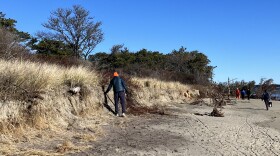The Mashantucket Pequot Tribal Nation will receive federal funds to improve conservation and climate practices at its farm in North Stonington.
The tribe accepted $2 million from the USDA’s Natural Resources Conservation Service (NRCS) and signed the Alternative Funding Agreement (AFA) to use the funds for conservation and climate-smart practices at the Tribe’s Meechooôk Farm.
Meechooôk Farm was established in 2016. The farm grows fruits and vegetables in greenhouses for tribe members year-round. The greenhouses contain hydroponic lettuce, tomatoes and fruit. The land also supports livestock including cows. It was made possible through support from the University of Connecticut and the Federally Recognized Tribes Extension Program.
A majority of the food harvested goes to a food assistance program for tribal members, the rest is sold. During the growing season, tribal members receive a box of vegetables every two weeks. Tribal leaders say the farm allows the tribe to be self-sufficient while being environmentally sustainable.
The tribe held a signing ceremony for the agreement on Tuesday at the 2024 Indigenous Foodways Summit at the Mashantucket Pequot Museum and Research Center. Chairman Rodney Butler and Thomas L. Morgart, the State Conservationist, signed the AFA Statement of Work and Agreement Form.
Butler said the funding strengthens the farm’s commitment to sustainable agriculture and environmental stewardship and reinforces the importance of its partnership with the USDA.
“This new agreement marks a significant step forward in our mission to protect and preserve our natural resources for future generations,” Butler said. “Together, we are ensuring a healthier, more resilient environment for our community and beyond.”
The funding will increase plant productivity and livestock production. It will also support initiatives to improve air quality, soil and water quality, and greenhouse gas emissions.





